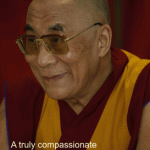Love It's not a word that currently sits easily in the vocabulary or ethos of the typical working environment. In fact, it jars the sensibilities of many when used in association with the workplace. But it's becoming more and more obvious that Love is a key ingredient (if not THE key ingredient) to successful, sustainable organisations of all kinds. Caring, … [Read more...] about Love Works
christine miller
Lovebirds
Violet Masked Lovebird (Agapornis) Their name stems from the parrots' strong, monogamous pair bonding and the long periods which paired birds will spend sitting together. I was thinking of an emblem or motif for the 'LoveWorks' project and book, and Lovebirds sprang to mind as a little messenger I could have decorating the pages and … [Read more...] about Lovebirds
Featured People
An Audience with HH the Dalai Lama His Holiness The Dalai Lama - The Embodiment of Compassion Listening to the Dalai Lama sharing His experiences and thoughts, one of the aspects which most impressed me was the amount of laughter - both from himself and from His audience. There is warm heartedness, humility and a lightness of spirit which is very apparent in His … [Read more...] about Featured People
Inviting Love
The Three Old Men A woman came out of her house and saw three old men with long white beards sitting in her front yard. She did not recognize them. She said "I don't think I know you, but you must be hungry. Please come in and have something to eat." "Is the man of the house home?" they asked. "No", she replied. "He's out." "Then we cannot come in", they … [Read more...] about Inviting Love
The Spirit of Money
We know that greed and the dedication to profit at all costs is part of what has gone wrong with the monetary system. We know that the planet's resources are unfairly apportioned - some people's portions are almost non-existent, and a very high percentage of wealth resides in the hands of just a few families, nations and sectors. We know that … [Read more...] about The Spirit of Money




